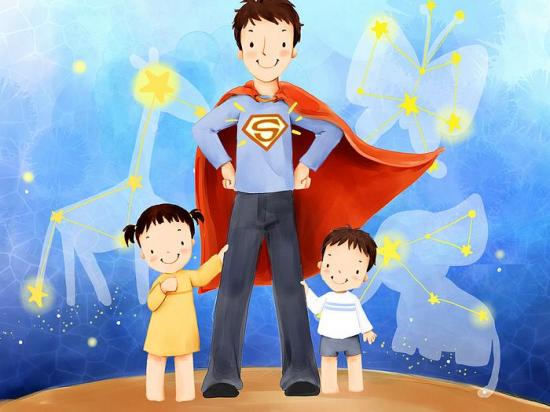 人类恐怕是地球上仅有的养育后代20载甚至更长时间的物种了。特别是对于男性而言,养育子女的迫切需求已经进化出一种内在的生物学机制,从而帮助人类适应这种改变。一项新的研究表明,成为一位父亲将导致睾丸素水平急剧下降,这意味着尽管高水平的激素或许可以帮助男人找到老婆,但是由睾丸素催生的一些特质,例如进攻性和竞争性,对于养育儿童而言却没有什么帮助。
人类恐怕是地球上仅有的养育后代20载甚至更长时间的物种了。特别是对于男性而言,养育子女的迫切需求已经进化出一种内在的生物学机制,从而帮助人类适应这种改变。一项新的研究表明,成为一位父亲将导致睾丸素水平急剧下降,这意味着尽管高水平的激素或许可以帮助男人找到老婆,但是由睾丸素催生的一些特质,例如进攻性和竞争性,对于养育儿童而言却没有什么帮助。
之前的研究表明,新父亲的睾丸素水平要低于那些同年龄的没有孩子的男性。然而究竟是亲子关系本身造成了这样的结果,还是与那些无拘无束的单身朋友相比,成为伴侣和父亲后的激素水平下降才是真正的诱因,科学家对此一直没有一个准确的说法。
为了搞清问题的来龙去脉,美国伊利诺伊州埃文斯顿市西北大学的人类学家Lee Gettler、Christopher Kuzawa和同事,以及菲律宾宿务市圣卡洛斯大学的研究人员,检测了一组正在参加“宿务纵向健康与营养调查”的男性的睾丸素水平。
Gettler指出:“宿务调查是同类研究中唯一对一大群男性从出生便开始跟踪的项目。它同时还提供了一种变化的文化,即越来越多的父亲开始参与到抚养孩子的行动中,这与男人在较早前仅仅充当一个养家糊口的角色截然相反。”
研究人员在2005年检测了参与此项研究的约600名男性早晚唾液中的睾丸素水平,当时他们的年龄基本为21岁;随后研究人员在2009年又重复了相同的试验。
研究人员发现,睾丸素水平最高的男性更有可能成为忠诚的伴侣和父亲——与那些没有孩子的单身男性相比,在这一点上,他们的睾丸素水平下降得更为明显。研究表明,与不是父亲的单身男性相比,新爸爸的睾丸素水平在早上和夜间分别下降了26%和34%,而前者的睾丸素水平早晚仅减少了12%和14%。这项研究同时发现,睾丸素水平最低的男性往往是那些报告称花费了最多时间养育孩子的人。同时,低水平的激素往往也同孩子的年龄相关,即那些孩子最小——尚未满月——的父亲的睾丸素水平下降得最明显。研究人员在9月12日的美国《国家科学院院刊》(PNAS)网络版上报告了这一研究成果。
Kuzawa认为:“睾丸素水平的降低似乎是一种生物学上的调整,从而帮助男性在孩子出现后转变他们做事的优先次序。”
其他的研究则表明,那些拥有较高睾丸素水平的男性更容易遇到婚姻问题,甚至离婚。
生物探索推荐原文摘要:
Longitudinal evidence that fatherhood decreases testosterone in human males
In species in which males care for young, testosterone (T) is often high during mating periods but then declines to allow for caregiving of resulting offspring. This model may apply to human males, but past human studies of T and fatherhood have been cross-sectional, making it unclear whether fatherhood suppresses T or if men with lower T are more likely to become fathers. Here, we use a large representative study in the Philippines (n = 624) to show that among single nonfathers at baseline (2005) (21.5 ± 0.3 y), men with high waking T were more likely to become partnered fathers by the time of follow-up 4.5 y later (P < 0.05). Men who became partnered fathers then experienced large declines in waking (median: −26%) and evening (median: −34%) T, which were significantly greater than declines in single nonfathers (P < 0.001). Consistent with the hypothesis that child interaction suppresses T, fathers reporting 3 h or more of daily childcare had lower T at follow-up compared with fathers not involved in care (P < 0.05). Using longitudinal data, these findings show that T and reproductive strategy have bidirectional relationships in human males, with high T predicting subsequent mating success but then declining rapidly after men become fathers. Our findings suggest that T mediates tradeoffs between mating and parenting in humans, as seen in other species in which fathers care for young. They also highlight one likely explanation for previously observed health disparities between partnered fathers and single men.







